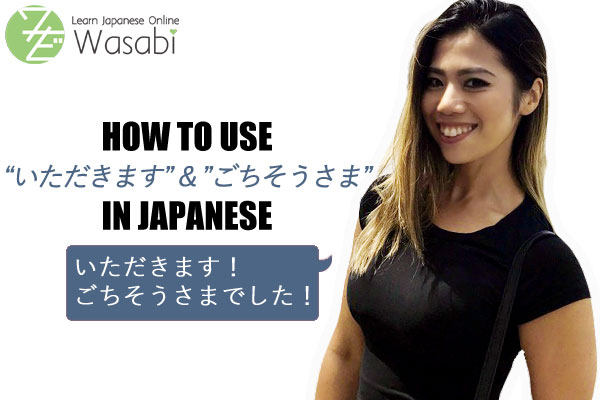How to use “いただきます” & “ごちそうさま” naturally in Japanese
Welcome back everyone! In this live-stream, Wasabi tutor Hidee explained how to use “いただきます” & “ごちそうさま” naturally in Japanese. Both are expressions that do not translate directly into English, so you can study their origins as well as the most natural way to use them in this article and video.
| Table of Contents [How to use “いただきます”] [How to use “ごちそうさま”] |
This lesson is aimed at students with an intermediate level of Japanese.
[How to use “いただきます”]
Surely everyone heard of “いただきます” and “ごちそうさま”. These phrases can be said before and after a meal.
Let’s start with the meaning of “いただきます”. In its simplest form “いただきます” is used before receiving something. That’s why the most common “いただきます” translation is:
to receive, to get, to accept, to take
For example:
プレゼントを頂きます。
I receive a present.
This explains why you say it before you eat. You’re “receiving” food after all.
“いただきます” comes from Japan’s Buddhism, which teaches respect for all living things. This thinking extends to mealtimes in the form of gratitude towards the plants, animals, farmers, hunters, chefs and everything that went into the making of the meal.
Also you can use “いただく” when you’re offered an actual physical thing. It’s like saying “I’ll take it” in a polite way.
However, you have to be aware of your politeness level when using “いただく” – even though it’s a more polite version of “もらう”, it’s not much more polite if you don’t conjugate the plain form “いただく” into the polite form “いただきます”.
For example, the politeness level of these two expressions is basically the same.
いただく = もらう
But conjugate them into the polite form and “いただきます” becomes much more polite than “もらいます”
いただきます > もらいます
Example
Q この本、いりますか?
Do you want this book?
A そうですね、いただきます。ありがとうございます。
Sure, I’ll take it. Thank you.
[How to use “ごちそうさま”]
Let’s move on to the meaning of “ごちそうさま”.
After finishing their meal, people say “ごちそうさま”, or to be more formal “ごちそうさまでした”.
The word “ごちそう” refers to a feast, luxurious food or a good meal. It’s another appreciation for the food and the people who are involved in the making of the meal. In other countries, it’d be “thank you for the meal” or “that was delicious!”
You can find out more about the origin of “ごちそうさま” when looking how it’s written in Kanji.
ご馳走様
ごちそうさま
“馳走” means “to run around”, or “to make every effort”. In ancient times, people would ride on the horse or run around to collect the food that goes into the making of a meal. Even without a horse, people would gave to shopping and run all over town to collect the food for the guests. Hence, the word “馳走” started to include the meaning of “to invite people/someone to eat”.
[adsense]
Example
今日はご馳走だよ!
We’re having a nice meal today!
すごいご馳走ですね!
The meal looks great!!
The work and effort of many people goes into each meal we eat. Perhaps we don’t get such a feast everyday, but every meal is “ごちそう” in a sense that someone made an effort and put love into the making of the food. If you have a feeling of gratitude, you wouldn’t be able to throw the food so easily. Hence you could say “ごちそうさま” to all the lives and effort you received.
If someone treats you or invites you to a meal at their house you should say “ごちそうさまでした”.
For example
昨日はご馳走さまでした!
Thank you for the meal yesterday.
Also when you treat someone you can also use this word. The verb is “ごちそうする”, and when someone treats you the action will be passive. “ごちそうになる”
Example
・今夜は私がご馳走します!
It’s my treat today!
・この間、佐藤さんにご馳走になりました。
Sato san treated me to a meal the other day.
That’s it for today. If you have any questions, you can always clear them up by booking a lesson with one of our native Japanese tutors. See you next time!
| いただく | To receive |
| いただきます | Thank you for the food (or polite version of “to receive”) |
| ごちそうさま | Thank you for the food, a good meal, a feast |
| ごちそうさまでした | Thank you for the food (polite) |
| ごちそうする | To treat someone to a meal |
| ごちそうになる | To be treated to a meal (by someone) |
| この間 | The other day, recently |




